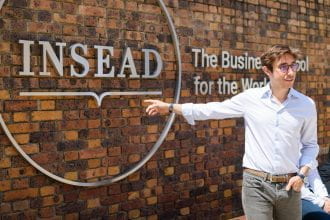Philippe Aghion, widely considered to be a leading economist in the world, recently joined INSEAD as Professor of Economics.
![[FINAL1] Philippe Aghion](https://alumnimagazine.insead.edu/files/2021/11/FINAL1-Philippe-Aghion.jpg)
Acclaimed for his research on endogenous growth theory, Philippe Aghion’s work gives us insights into the dynamics of innovation in capitalist economies. Rising inequality, stagnating growth and environmental disasters all support the view that capitalism is in crisis. But how do we rethink capitalism to create a better future? Philippe Aghion studies how creative destruction – ‘a contradiction at the core of capitalism’ – supports a more prosperous, inclusive and sustainable economy.
Capitalism amidst Covid
Creative destruction refers to the process in which new innovations displace old technologies. One of the simplest examples is how the cassette tape was displaced by the compact disc, which was then displaced by the MP3 player, which was then displaced by online streaming services. Understanding the role of creative destruction in economic growth has become increasingly important during the Covid-19 pandemic, as the crisis has both exposed and exacerbated problems in capitalist economies.
“Covid was a revelator,” says Aghion. “In the US, it revealed a broken social model. In Europe, it revealed a broken innovation model. I would like to see a capitalism that combines the good side of the American system [which drives innovation] with the good side of the European model [which offers more protections for citizens]. Some people believe you need to have one or the other, but I disagree sharply with that idea. Policies that support basic security, education and competition can make you both more inclusive and more innovative.”
The Schumpeterian Growth Paradigm
Aghion has earned widespread recognition for his research and insights on the economics of growth. Together with Brown University Professor Peter Howitt, he developed the so-called ‘Schumpeterian paradigm’ and extended it in several directions. The paradigm, which models growth generated by creative destruction, is used to analyse the design of growth policies and the state’s role in growth. Aghion co-authored with Howitt the Endogenous Growth Theory (MIT Press, 1998), considered to be one of the best books on modern economic growth theory, and The Economics of Growth (MIT Press, 2009).
More recently, Aghion received accolades for his new book, The Power of Creative Destruction: Economic Upheaval and the Wealth of Nations (Harvard University Press, 2021), which he co-authored with Céline Antonin and Simon Bunel. Nobel Laureate in Economics Sciences Angus Deaton called the authors “leaders” in creative destruction and said, “their insights are essential if policy is to restore growth in today’s faltering capitalism.” Nobel Laureate Jean Tirole added that the authors “advocate a regulated capitalism that will allow us to keep society prosperous and the planet green … [and explain] how to manage the creative destruction that over the past two centuries has brought to our society a previously unimaginable prosperity.” President Emmanuel Macron called Aghion’s work “crucial in characterising what a strong innovation ecosystem means in practice because [it] ventures behind the scenes of innovation.”
In addition to his appointment at INSEAD, Aghion is a Professor at the College de France, Visiting Professor at the London School of Economics, and Fellow of the Econometric Society and the American Academy of Arts and Sciences. He also serves on the Scientific Advisory Board of the Max Planck Institute for Research on Collective Goods. In 2021, he was appointed to the World Bank-International Monetary Fund High-Level Advisory Group on Sustainable and Inclusive Growth.
Aghion is a recipient of multiple awards, including the Yrjö Jahnsson Award for the best European economist under 45 (2001), John Von Neumann Award (2009) and BBVA Frontier of Knowledge Award (2020).


